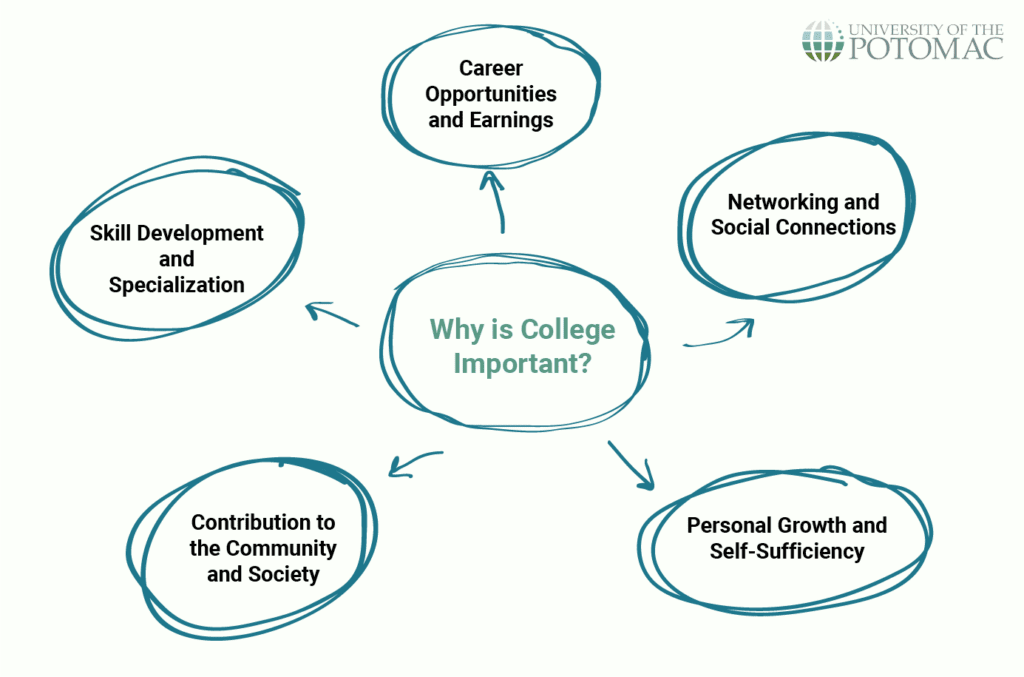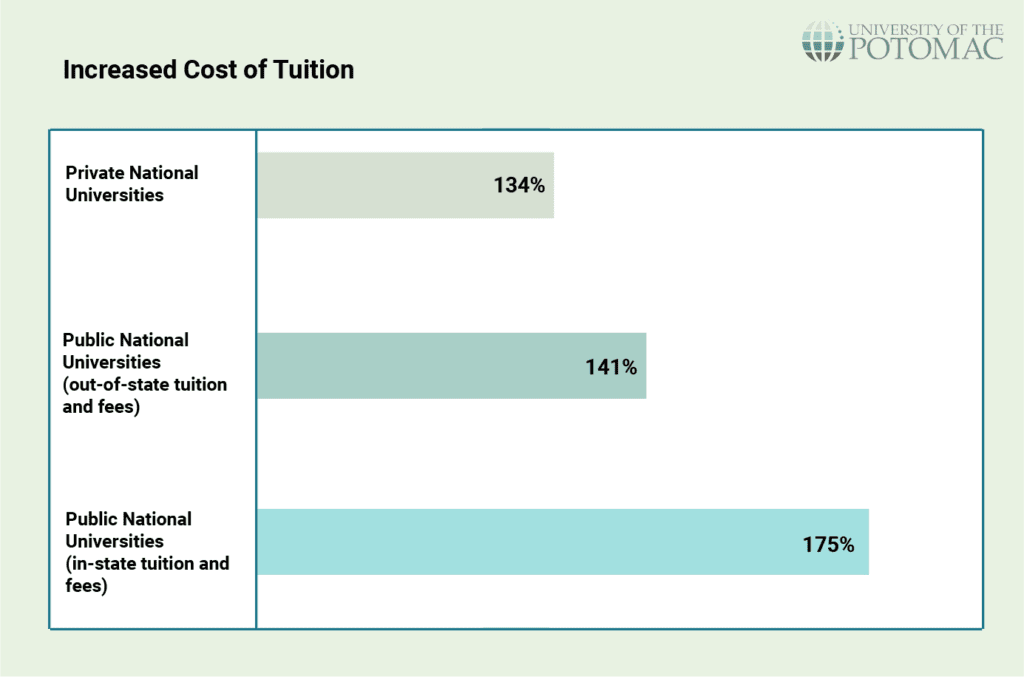
It’s perfectly natural for individuals to ponder, “Why is college important?” especially when witnessing people like Bill Gates, who achieved remarkable success without a college degree. However, it’s essential to recognize that while outliers like Gates exist, they are exceptions rather than the norm. For each individual who thrives without a degree, countless others face challenges due to a lack of necessary skills and knowledge to secure employment and navigate life successfully.
While surely unique paths can lead to success, pursuing a college education is often considered the most reliable and secure way to prosper. So, read on as we explore the many benefits of higher education while highlighting some valid concerns that individuals often have.
Why is College Important?

For most people, college is a crucial phase in their personal and intellectual growth journey. It is a period of self-discovery, diverse experiences, and knowledge acquisition, laying the foundation for future pursuits. It equips individuals with the tools to navigate the world’s complexities and pursue various aspirations. Below, we’ll highlight some key areas directly influenced by college, each contributing significantly to an individual’s development.
Career Opportunities and Earnings
Attending college and choosing the right major can lead to increased career opportunities as many professions require advanced degrees, which can be obtained through higher education. In fact, according to a report published in 2022 by the National Center for Education Statistics, individuals holding a college degree enjoy better employment opportunities than those with lower educational achievements. The study revealed that individuals with Bachelor’s degrees or advanced degrees exhibited higher employment rates than those who did not pursue higher education.
Skill Development and Specialization
Colleges provide a structured environment for students to gain specialized knowledge and develop the necessary skill sets for their chosen fields. Through rigorous academic programs, hands-on training, and exposure to the latest developments, colleges help prepare students to become experts and excel in their careers. Furthermore, by providing direct access to active researchers and industry practitioners as faculty staff, students are exposed to cutting-edge information, fostering innovation and adaptability.
Networking and Social Connections
Sometimes, who you know is as important as what you know. So, in addition to equipping you with knowledge and skills, colleges also offer excellent opportunities for you to create a network that can lead to internships, jobs, projects, or mentorship possibilities. From interacting with your peers and alums to learning from experienced teachers and meeting professionals in the field, you can build a good network in college, which can have a long-lasting positive impact on your career.
Contribution to the Community and Society
Colleges, in general, make substantial contributions to the community and society through groundbreaking research and innovation. They serve as hubs for discovery, where brilliant minds come together to solve pressing challenges and push the boundaries of knowledge — What if brain tumors could be treated painlessly at home without anesthesia? It might seem impossible, but researchers at Stanford Medicine are developing a small wireless device that one day could do just that. Johns Hopkins was the institute that ensured that the New Horizons spacecraft would go past Pluto, while MIT developed a heat engine with no moving parts. The possibilities are endless!
Personal Growth and Self-Sufficiency
Lastly, college is often a dynamic environment that imparts more than subject-specific knowledge. While students certainly gain expertise in their chosen fields, these institutions also assist students in cultivating essential life skills. In addition to mastering complex concepts, students learn the art of time management, problem-solving, communication, teamwork, and various other areas. This way, colleges empower them with the practical skills and competencies necessary to succeed in a diverse and multifaceted world.
Criticism of Higher Education
Despite the evident significance and numerous advantages of higher education, certain factors can make individuals hesitant about pursuing college. Below, we’ll explore some common criticisms and concerns you might have regarding higher education.
Increased Cost of Tuition

Higher education faces substantial criticisms, particularly regarding the escalating tuition fees that burden students with long-term debt. Recent data shows that over the past two decades, there has been a significant increase in tuition and fees for private National Universities, with a rise of 134%. Public Universities that charge out-of-state tuition and fees have experienced an even more substantial increase of 141%, whereas the sharpest growth has been observed in in-state tuition and fees, which have surged by 175%.
Interested in pursuing a degree?
Fill out the form and get all admission information you need regarding your chosen program.
This will only take a moment.
Message Received!
Thank you for reaching out to us. We will review your message and get right back to you within 24 hours.
If there is an urgent matter and you need to speak to someone immediately you can call at the following phone number:
- We value your privacy.
Adaptability to the Job Market
Amidst the rapidly evolving job markets, concerns regarding the adaptability of traditional degrees persist. Traditional college programs might not effectively equip graduates for the dynamic transformation of today’s job market, influenced by technological advances and changing industry landscapes. Understandably, students might hesitate to pursue college paths that do not align with current job demands or fail to provide skills needed in the market, potentially leading to difficulties securing relevant positions and necessitating ongoing upskilling to stay competitive.
Strategies to Overcome Higher Education Challenges
Firstly, to ease the financial burden associated with tuition fees and student loans, we advise you to investigate scholarship opportunities and financial aid packages offered by colleges and external organizations. Scholarships can significantly reduce the overall cost of tuition and make higher education more affordable. Additionally, many institutions provide grants and work-study programs that offer financial assistance and the chance to gain work experience simultaneously.
Alternatively, you could also consider community colleges and online education options, which often offer more cost-effective pathways to earning a degree or completing prerequisite coursework.
On the other hand, in order to ensure adaptability to job market demands, it is best to research the program’s relevance before enrolling. Look for programs emphasizing practical skills, hands-on experience, and industry partnerships. You could also seek programs offering internships or cooperative education opportunities, as such experiences provide real-world exposure and help bridge the gap between academia and industry.
The key is to recognize that education does not end with a degree. So, be prepared to engage in ongoing learning, professional development, and upskilling to stay competitive in an ever-changing job landscape.
Is College Worth It?
The question of whether college is worth it or not is a complex topic that may yield different answers for different people. For many, the long-term value of a college degree extends beyond immediate financial gains, encompassing intellectual growth, expanded horizons, and the potential for lifelong learning.
When considering whether you should pursue college or not, it is essential to consider:
- Short-term costs against long-term benefits
- Your aspirations
- Alternative paths to career success
Conclusion
While college undoubtedly offers numerous advantages, such as enhanced career prospects, skill development, and personal growth, the surge in tuition fees and uncertainties surrounding the usefulness of certain degrees have cast a shadow of doubt on the value of this investment. At the end of the day, it’s important to remember that personal ambitions and circumstances mold the worth of college. The essence lies in making informed decisions that resonate with your long-term goals.
Frequently Asked Questions (FAQ):
What are the benefits of obtaining a college degree?
A college degree offers many benefits, including better job opportunities, increased earning potential ( see the highest-paying master’s degrees), personal development, wider networking options, and more.
Do you need a college degree to have a promising future?
Although a college degree can lead to numerous opportunities, it is not the sole factor in securing a successful future. Depending on individual goals and circumstances, success may also be attained through vocational training, entrepreneurship, and skill development.
How does higher education contribute to better career opportunities?
Higher education equips individuals with specialized knowledge and skill sets that are often prerequisites for many professional roles. It also provides access to networking opportunities, internships, and other resources to enhance employability.
Is college necessary for acquiring specialized skills in a particular field?
Yes, college is essential for acquiring specialized skills in a particular field. Their academic programs and practical training opportunities help students gain the expertise and proficiency required for success in specific industries.
How does a college education impact one’s contribution to society?
College education has a profound impact on society by imparting knowledge, critical thinking, and ethical values. It also serves as a hub for research and innovation, driving technological advancements, healthcare, sustainability, and more.
What are the counterarguments against the significance of higher education?
Some counterarguments include the rising tuition costs and the practical relevance of certain degrees in today’s rapidly changing industries.
What are the long-term implications of investing in higher education?
Investing in higher education can lead to increased earning potential, improved job stability, and personal growth. However, student loan debt and the rapidly changing job landscape require careful consideration when evaluating the long-term financial implications.










